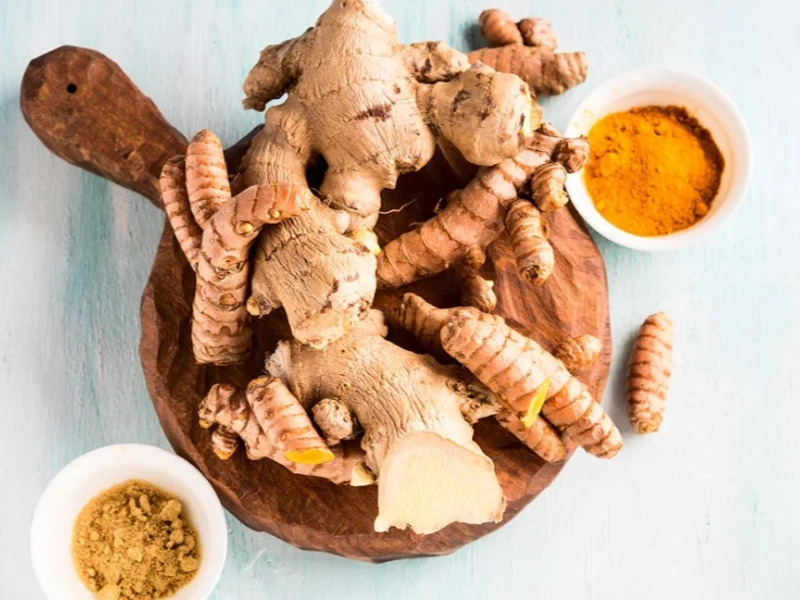The Ginger Revolution: How This Root Can Transform Your Body
Advertisement
4. The Anti-Inflammatory Superhero: Ginger's Role in Fighting Chronic Inflammation

Advertisement
From arthritis and autoimmune diseases to heart disease and cancer, chronic inflammation is becoming acknowledged as the underlying cause of many modern health problems. In this regard, ginger becomes a natural super hero in the battle against this ubiquitous medical issue. The power of ginger to fight inflammation can have transforming effects on the body, maybe relieving pain, lowering the risk of certain chronic diseases, and enhancing general health and well-being.
Particularly gingerols and shogaols, ginger's anti-inflammatory action comes from its bioactive elements at its core. These drugs essentially stop the inflammatory reaction by reducing the synthesis of pro-inflammatory cytokines and chemokines. Though without the possible negative effects linked with long-term use of these drugs, this action is comparable to those of non-steroidal anti-inflammatory drugs (NSAIDs). The natural, whole approach of ginger's anti-inflammatory properties makes them beautiful; one may safely include them into daily life for long-term advantages.
Among the most well researched uses of ginger's anti-inflammatory properties is osteoarthritis therapy. Regular ginger intake has been linked in many studies to notable pain and movement improvements for those with degenerative joint disease. By helping to lower inflammation and pain in the joints, the anti-inflammatory drugs in ginger may help to slow down the course of the disease and enhance quality of life for persons affected.
Beyond osteoarthritis, ginger's anti-inflammatory qualities show promise in treating several inflammatory diseases. Studies point to ginger's possible help in reducing rheumatoid arthritis, an inflammatory disease marked by ongoing inflammation. Those with this crippling illness may find relief from the root's capacity to control the immunological reaction and lower inflammation.
Additionally benefiting the cardiovascular system are ginger's anti-inflammatory properties. Heart disease develops mostly from chronic inflammation, hence ginger's capacity to fight this inflammation might help lower the risk of cardiovascular diseases. Studies have indicated that ginger can help reduce C-reactive protein levels, a sign of inflammation in the body closely linked with risk of heart disease. Ginger might help protect the heart and blood arteries by lowering systematic inflammation, so perhaps reducing the incidence of heart attacks and strokes.
Within the field of digestive health, ginger's anti-inflammatory qualities are quite important. Significant pain and misery can be brought on by inflammatory bowel illnesses such ulcerative colitis and Crohn's disease. By lowering intestinal inflammation, ginger provides a natural way to treat various disorders and may help symptoms be lessened.
Additionally affecting brain health and cognitive ability could be ginger's anti-inflammatory properties. Alzheimer's and Parkinson's illnesses as well as other neurodegenerative disorders have been connected to chronic inflammation. According to some studies, ginger's anti-inflammatory properties could help shield brain cells from harm and maybe reduce the course of various disorders.
Moreover, ginger's anti-inflammatory qualities could help to explain its possible anti-cancer actions. Different kinds of cancer are known to grow and spread in part by chronic inflammation. Reducing inflammation could enable ginger to assist the body produce conditions less favorable for cancer growth. Although further study is required in this field, preliminary findings indicate great possibilities for ginger as a supplemental treatment and in cancer prevention.
Although ginger's anti-inflammatory properties are strong, they are most beneficial when used with a whole approach to health. Regular ginger intake combined with a balanced diet high in other anti-inflammatory foods, frequent exercise, stress management, and enough sleep can provide a synergistic impact boosting the body's capacity to fight chronic inflammation.
Including ginger in your daily regimen can be both simple and taste-ful. From including fresh ginger to your cuisine and savoring ginger tea to using premium ginger pills, there are many methods to maximize the anti-inflammatory potential of this amazing root. As we learn more about the whole extent of ginger's anti-inflammatory properties, it is evident that this ancient spice has a major role to play in modern approaches to health and wellness since it provides a natural, efficient way to fight chronic inflammation and change the inside out condition of your body.
Advertisement
You May Like

